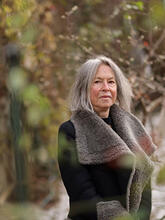
When I was a small child of, I think, about five or six, I staged a competition in my head, a contest to decide the greatest poem in the world. There were two finalists: Blake’s “The Little Black Boy” and Stephen Foster’s “Swanee River.” I paced up and down the second bedroom in my grandmother’s house in Cedarhurst, a village on the south shore of Long Island, reciting, in my head as I preferred, not from my mouth, Blake’s unforgettable poem, and singing, also in my head, the haunting, desolate Foster song. How I came to have read Blake is a mystery. I think there were a few poetry anthologies in my parents’ house among the more common books on politics and history and the many novels. But I associate Blake with my grandmother’s house. My grandmother was not a bookish woman. But there was Blake, The Songs of Innocence and of Experience, and also a tiny book of the songs from Shakespeare’s plays, many of which I memorized. I particularly loved the song from Cymbeline, understanding probably not a word but hearing the tone, the cadences, the ringing imperatives, thrilling to a very timid, fearful child. “And renownèd be thy grave.” I hoped so.
Read the complete lecture here: https://www.nobelprize.org/prizes/literature/2020/gluck/lecture/
Stream it here: https://www.nobelprize.org/